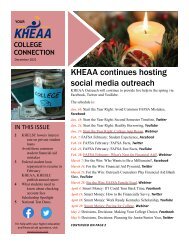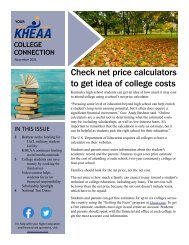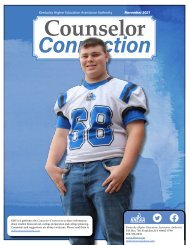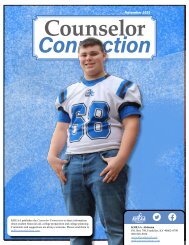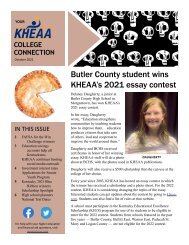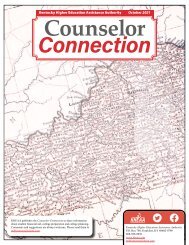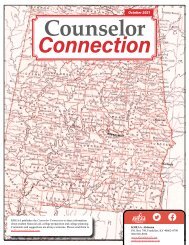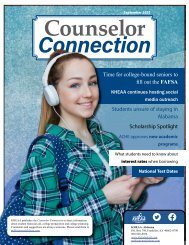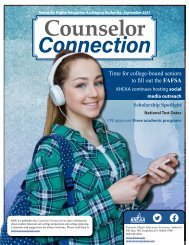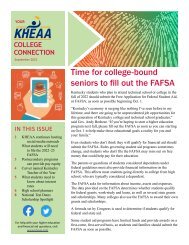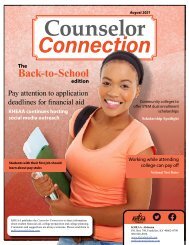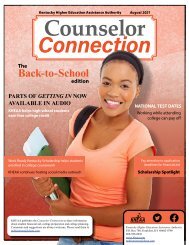YKCC September 2020
- No tags were found...
Create successful ePaper yourself
Turn your PDF publications into a flip-book with our unique Google optimized e-Paper software.
YOUR<br />
COLLEGE<br />
CONNECTION<br />
SEPTEMBER <strong>2020</strong><br />
It’s time to file the FAFSA<br />
High school seniors and others planning to attend college or technical<br />
school next fall should fill out the Free Application for Federal Student<br />
Aid, or FAFSA, as soon as possible beginning Oct. 1.<br />
The information on the FAFSA determines if students qualify for<br />
federal grants and student loans. It is also required to apply for state<br />
grants and scholarships. In addition, many colleges use the information<br />
to award their own grants and scholarships.<br />
IN THIS ISSUE<br />
2 - Social media sessions<br />
2 - What students need for the<br />
FAFSA<br />
3 - College visits during the<br />
pandemic<br />
3 - Financial aid webinars<br />
4 - High school planners<br />
4 - Scholarship Spotlight<br />
5 - Poetry Out Loud registration<br />
5 - Students should learn about<br />
contracts<br />
6 - ACT, SAT test dates<br />
For help with your higher education<br />
and financial aid questions, visit<br />
www.kheaa.com.<br />
The FAFSA asks for information about income, assets and expenses.<br />
A formula set by Congress determines eligibility for federal and state<br />
aid. If the student is considered a dependent under federal guidelines,<br />
both the student and parents must provide financial information. Nearly<br />
all students going directly to college from high school are considered<br />
dependent.<br />
Some student aid programs have limited money and provide funds on a<br />
first-come, first-served basis, so it’s important to submit the FAFSA as<br />
soon as possible.<br />
Even if they don’t think they’ll qualify for financial aid, students should<br />
submit the FAFSA. They may be surprised, because student aid rules<br />
change all the time.<br />
The FAFSA should be submitted at studentaid.ed.gov/sa/fafsa.<br />
Students who do not have an FSA ID, which is needed to file the<br />
FAFSA, must first visit fsaid.ed.gov to set one up. Parents of dependent<br />
students must also set up an FSA ID.<br />
See page 2 for items students will need to fill out the FAFSA.
2<br />
KHEAA continues hosting<br />
social media outreach<br />
KHEAA Outreach will continue to provide live help<br />
via Facebook, Twitter and Instagram. The schedule is:<br />
• Sept. 29: FAFSA Week: FAFSA Trivia, Facebook<br />
• Sept. 30: FAFSA Week: To Pay Back or Not Pay<br />
Back, Twitter<br />
• Oct. 1: FAFSA Week: The Early Bird Gets the<br />
Worm, Instagram<br />
• Oct. 6: FAFSA Feature: FSA ID Boot Camp,<br />
Facebook<br />
• Oct. 7: FAFSA Feature: Needed Documents,<br />
Twitter<br />
• Oct. 8: FAFSA Feature: Special Circumstances<br />
for the FAFSA, Instagram<br />
• Oct. 13: FAFSA Faux Pas: Avoiding Common<br />
Mistakes, Facebook<br />
• Oct. 14: FAFSA Faux Pas: Next Steps After<br />
Completing the FAFSA, Twitter<br />
• Oct. 15: FAFSA Faux Pas: The Risks of Not<br />
Completing the FAFSA, Instagram<br />
• Oct. 20: Real Talk: Real Life Getting In,<br />
Facebook<br />
• Oct. 21: Real Talk: Ways to Pay, Twitter<br />
• Oct. 22: Real Talk: Admit Me, Instagram<br />
• Oct. 27: FAFSA Follow Up: KASFAA Panel,<br />
Facebook<br />
• Oct. 28: FAFSA Follow Up: Frequently Asked<br />
Questions, Twitter<br />
• Oct. 29: FAFSA Follow Up: Discussing<br />
Dependency, Instagram<br />
All sessions begin at 3 p.m. Eastern, 2 p.m. Central.<br />
The links are:<br />
• www.facebook.com/KHEAA/<br />
• www.twitter.com/KHEAA<br />
• www.instagram.com/kheaaoutreach/?hl=en<br />
What students will need<br />
to file the 2021–22 FAFSA<br />
In addition to the FSA ID, students will need the<br />
following to complete the FAFSA.<br />
• Social Security number and Alien Registration<br />
Number (if they’re not a U.S. citizen)<br />
• Driver’s license number (if they have one)<br />
• 2019 tax records. On the 2021–22 FAFSA,<br />
students and parents will use their 2019 income<br />
information.<br />
• Records of their untaxed income. This may not<br />
apply to everyone. It includes things like child<br />
support received, interest income and veterans’<br />
non-education benefits.<br />
• Records of their assets. Includes savings and<br />
checking account balances, as well as the value<br />
of investments such as stocks and bonds and real<br />
estate (but not the home in which the student’s<br />
family lives).<br />
• List of the schools they’re interested in<br />
attending. Even if there is only a slight chance a<br />
student will apply to a college, list the school on<br />
their FAFSA. They can always remove schools<br />
later. If they wait to add a school, though, they<br />
could miss out on first-come, first-served financial<br />
aid.
Tips for visiting colleges<br />
during the pandemic<br />
After closing down due to the COVID-19 epidemic,<br />
many college campuses are now back open and<br />
accepting visitors. It is important to plan ahead and<br />
take precautions when planning in-person college<br />
visits.<br />
The college you plan on visiting likely has a set of<br />
policies in place concerning their guidelines and<br />
procedures for visiting their campus. Visit the website<br />
of the school you plan to visit to see what safety<br />
guidelines they have in place.<br />
Be sure to schedule your visit in advance. Make an<br />
appointment with the admissions office of the school.<br />
Many schools offer special programs for visiting<br />
students, and the admissions staff will also be able to<br />
give you further instructions for your visit. You will<br />
need to know which areas you will be allowed to visit<br />
and any areas that may be restricted.<br />
Follow the Centers for Disease Control guidance<br />
for college students while on campus. The CDC<br />
recommends that students:<br />
• Stay at least 6 feet apart from others when<br />
possible,<br />
• Wash their hands or use hand sanitizer with at<br />
least 60 percent alcohol, and<br />
• Wear a face cover in public spaces and common<br />
areas.<br />
If you are uncomfortable or unable to visit a college<br />
in-person, most schools now offer virtual touring<br />
options. Contact the school for more information.<br />
KHEAA to hold webinars<br />
about financial aid<br />
During the fall semester, KHEAA Outreach is<br />
offering a series of webinars about financial aid and<br />
financial literacy. The schedule is:<br />
• Paying for College 101, , Monday, Sept. 29, noon.<br />
• FAFSA Frenzy: A FAFSA How To, , Wednesday,<br />
Oct. 1, noon.<br />
• FAFSA Frenzy: A FAFSA How To, , Wednesday,<br />
Oct. 8, 7 p.m.<br />
• FAFSA Frenzy: A FAFSA How To, , Wednesday,<br />
Oct. 15, noon.<br />
• FAFSA Frenzy: A FAFSA How To, , Wednesday,<br />
Oct. 22, 7 p.m.<br />
• FAFSA Frenzy: A FAFSA How To, , Wednesday,<br />
Oct. 29, noon.<br />
• Adults Returning to College, , Wednesday, Nov.<br />
19, 7 p.m.<br />
• It’s Money, Baby: A Guide to Financial<br />
Literacy, , Wednesday, Dec. 17, 7 p.m.<br />
All times listed are Eastern time.<br />
To register for a webinar, visit https://<br />
kygoestocollege.com/. . That page also has links to<br />
videos of previous webinars.<br />
3
4<br />
High school planners<br />
Juniors<br />
Sign up for activities to boost your college<br />
applications.<br />
Find out about schools you’re interested in<br />
attending.<br />
Go to college fairs and open houses and learn as<br />
much as you can from the Internet about schools.<br />
Take the PSAT.<br />
Sign up for ACT or SAT prep courses. Public high<br />
school juniors must take the ACT in the spring. If<br />
you don’t attend a public high school, sign up for<br />
the ACT or SAT. See national test dates on page 6.<br />
Check with each school’s financial aid office<br />
to see what financial aid forms they require in<br />
addition to the FAFSA.<br />
Start investigating private and public sources for<br />
financial aid. Take note of scholarship deadlines<br />
and plan accordingly.<br />
If you haven’t taken the ACT/SAT or if you think<br />
you can do better, register. See page 6 for a list of<br />
national test dates.<br />
Apply for the Governor’s Scholars Program. Your<br />
counselor’s office should have applications.<br />
Sign up for a Governor’s School for the Arts<br />
workshop. Registration opens Nov. 4.<br />
Decide if you should take AP exams in May.<br />
Investigate the CLEP program.<br />
Seniors<br />
Meet with college admissions representatives at<br />
college fairs or when they visit your school.<br />
Attend a financial aid seminar if your school<br />
offers one.<br />
If you haven’t picked a college yet, narrow your<br />
list by visiting schools and talking with students.<br />
You should probably talk with your parents too.<br />
If you’re going Early Decision, most schools will<br />
want the application submitted soon.<br />
If you’re going through the regular admissions<br />
process, it’s time to ask teachers to write<br />
recommendations and to polish your admissions<br />
essay if you have to write one.<br />
Scholarship Spotlight<br />
Kentucky Concrete Association:<br />
William T. Robertson Essay Award Scholarship<br />
Eligibility: Must be a Kentucky resident, be a<br />
graduating high school senior and submit an essay<br />
Award: $2,000<br />
Deadline: November 1<br />
Contact: Counselor, www.kyconcrete.org/essay
State Poetry Out Loud<br />
registration continues<br />
The deadline to register for Kentucky’s 2021 Poetry<br />
Out Loud is Oct. 2.<br />
All Kentucky high schools, public and private, may<br />
apply. Home-schooled students may compete through<br />
a participating local high school or a home-school<br />
regional competition. In addition, each participating<br />
school is eligible for a residency from a Kentucky<br />
Arts Council Teaching Artists Directory member<br />
to help students polish their recitations before<br />
competing.<br />
The contest starts at the classroom level. Winners<br />
advance to school-wide competition, then to the state<br />
competition, March 2, 2021.<br />
The winner of the state finals receives $200 and<br />
an all-expenses-paid trip with an adult chaperone<br />
to Washington, D.C., to compete for a $20,000<br />
scholarship in the national competition. The state<br />
winner’s school receives a $500 stipend for the<br />
purchase of poetry books. The state first runner-up<br />
receives $100, with $200 going to their school library.<br />
Accommodations will be made for viewers who are<br />
deaf or hard of hearing.<br />
For more information about Poetry Out Loud in<br />
Kentucky, contact Samuel Lockridge at 502-892-3124;<br />
or samuel.lockridge@ky.gov.<br />
For a general overview of the Poetry Out Loud<br />
National Recitation Contest, visit<br />
www.poetryoutloud.org.<br />
For more information and a complete list of rules,<br />
visit the Kentucky Arts Council website.<br />
Students should take care<br />
when signing contracts<br />
At some point in their lives, students will have to<br />
sign a contract. When they do, they should keep the<br />
following tips in mind.<br />
A contract is a written legal document between<br />
two or more parties in which an offer is made and<br />
accepted. An apartment lease, an insurance policy or<br />
a cell phone plan are all examples of contracts. Read<br />
all contracts thoroughly and ask questions before<br />
you sign. Complete everything and keep a copy for<br />
yourself.<br />
“With the economic uncertainty caused by the<br />
pandemic, students should exercise particular caution<br />
before signing a contract,” Governor Andy Beshear<br />
said. “They should make sure they are confident they<br />
can fulfill their part of the contract before making that<br />
commitment.”<br />
Consumer protection laws let you change your mind<br />
and cancel some contracts within three days of<br />
signing. Before you sign any contract, find out if you<br />
have that option. If later you find it’s necessary to<br />
cancel the contract, you may have to pay a big penalty<br />
or continue to pay what is owed under the terms of the<br />
contract.<br />
Never sign a contract unless you read and understand<br />
the terms of the agreement. If you feel pressured,<br />
walk away.<br />
5
6<br />
ACT National Test Dates<br />
Test Date Registration Deadline Scores Available<br />
Dec. 12, <strong>2020</strong> Nov. 6, <strong>2020</strong> TBD<br />
Feb. 6, 2021 Jan. 8, 2021 TBD<br />
April 17, 2021 March 12, 2021 TBD<br />
June 12, 2021 May 7, 2021 TBD<br />
SAT National Test Dates<br />
Nov. 7, <strong>2020</strong> Oct. 7, <strong>2020</strong> Nov. 20, <strong>2020</strong><br />
Dec. 5, <strong>2020</strong> Nov. 5, <strong>2020</strong> Dec. 18, <strong>2020</strong><br />
March 13, 2021 Feb. 12, 2021 March 26, 2021<br />
May 8, 2021 April 8, 2021 May 21, 2021<br />
June 5, 2021 May 6, 2021 July 14, 2021




